
José Roberto García Chávez
This research work aims to generate a sustainable model for social, cultural and economic integration of people in the Caribbean region of Mexico. The case study is located in the city of Yaxunáh, Yucatán. The methodology applied aimed at contributing to the social equity and preservation of the cultural heritage of the region, as well as to provide the basis for improving the environment and mitigate Climate Change; and it consisted of these stages: (i) a detailed study of local conditions, including socio-cultural and economic characteristics, climatic and bioclimatic analysis and building typologies; (ii) designing and building a dwelling in Yaxunáh that integrates climate and natural lighting strategies, sustainable energy, water and resource management, waste management and organic food production with areas for vegetables and an organic garden applying traditional and sustainable agricultural techniques, such as crop rotation and the use of natural fertilizers, to ensure efficient, compatible and environmentally friendly production. The results of this work have shown a favourable response from local people to implement the premises proposed in this work, which are expected to generate a multiplier effect in the community, allowing the development of other productive projects and improving the economy and the social and cultural identity of the inhabitants of Yaxunáh and nearby regions, to contribute to the social equity and the well-being of them, preserving the social and cultural heritage as well as to optimize the quality of living and improve people's health and eventually improving the environment and to mitigate Climate Change.
Keywords: Sustainability, solar Maya, bioclimatic technologies, social and cultural identity.